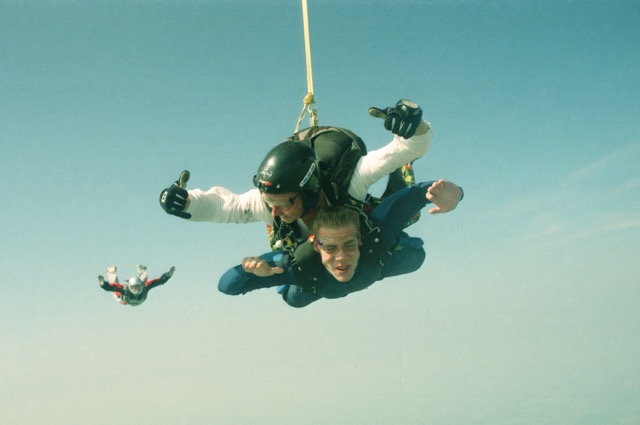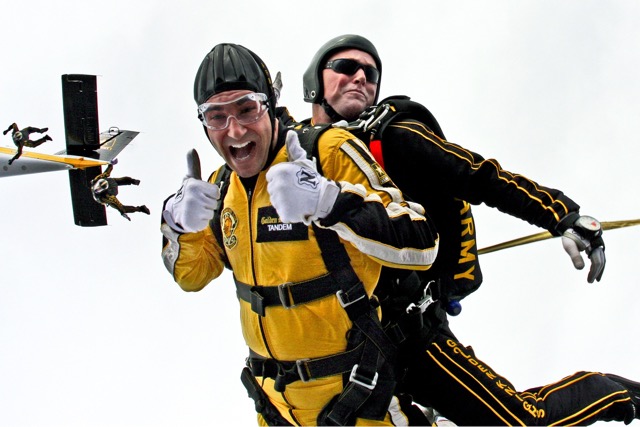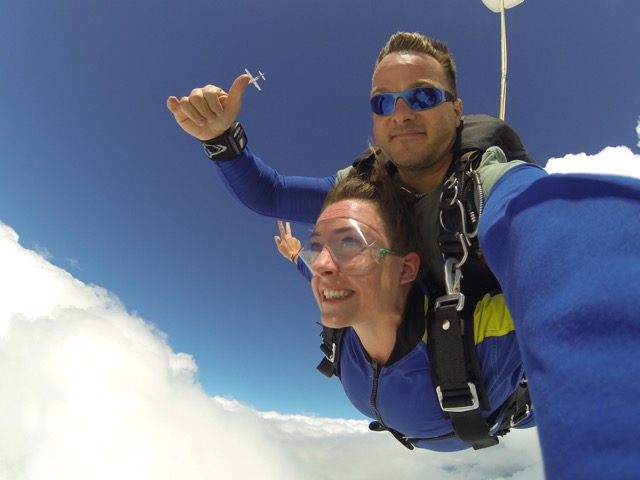If you’ve ever found yourself hesitating at the edge of a plane, heart pounding and palms sweaty, you’re not alone. Fear is a natural instinct that often keeps us from taking risks and stepping outside of our comfort zone. But what if we told you that understanding the psychology of fear could empower you to conquer it? We’ll delve into the inner workings of fear, discuss how to recognize and confront it head-on, and explore the exhilaration that comes with skydiving and building mental resilience along the way. Get ready to defy your fears and embrace the thrill of skydiving like never before.
Understanding The Psychology Of Fear

Skydiving has always been one of my biggest fears. The mere thought of jumping out of a plane at thousands of feet above the ground sends shivers down my spine. But recently, I decided to face my fear head-on and give it a try. As I delved deeper into the world of skydiving, I realized that there’s more to fear than meets the eye. Understanding the psychology of fear is crucial if you want to conquer it and experience the thrill that lies on the other side.
Fear is a natural instinct that has helped humans survive for centuries. Back in the day, our ancestors relied on fear to protect themselves from dangerous predators. Today, while we no longer face the kind of threats they did, our bodies still respond to fear in the same way. When we encounter a fearful situation, a small part of our brain called the amygdala sets off a chain reaction, releasing a surge of adrenaline and preparing us for fight or flight.
Understanding this primal response can help us gain control over our fears. One way to do this is by recognizing that fear is often irrational. Just because something appears scary doesn’t mean it poses an actual threat. For instance, the fear of skydiving is often based on misconceptions or exaggerated beliefs about its dangers. By challenging these irrational thoughts and replacing them with more realistic ones, we can begin to rewire our brains and change our perception of fear.
- Recognizing and acknowledging our fears is the first step towards conquering them. It’s important to face our fears head-on rather than avoiding them. By gradually exposing ourselves to the things that scare us, we can desensitize our mind and build resilience.
| Benefits of Facing Fear |
|---|
| 1. Increased self-confidence |
| 2. Expanded comfort zone |
| 3. Overcoming limitations |
| 4. Embracing new experiences |
By stepping out of our comfort zones and facing our fears, we open ourselves up to a world of new possibilities. Skydiving, for example, not only offers an adrenaline rush but also teaches us valuable life lessons. It pushes us to confront our fears and trust in our abilities, ultimately empowering us to overcome challenges in our everyday lives.
So, the next time you find yourself paralyzed by fear, remember that understanding the psychology behind it is key. Recognize that fear is often unfounded and irrational, and challenge yourself to face it head-on. By doing so, you can build mental resilience and embark on thrilling adventures that will leave you feeling stronger and more alive than ever before.
Recognizing And Facing Fear Head-On

Fear is a powerful emotion that can hold us back from experiencing new adventures and achieving our goals. Whether it’s the fear of spiders or the fear of heights, we all have our own fears that can paralyze us at times. But what if we could face our fears head-on and conquer them? Imagine the sense of accomplishment and empowerment that comes from overcoming something that once seemed impossible. We will explore the psychology of fear, understand why it affects us the way it does, and learn valuable strategies for recognizing and facing fear head-on.
The Psychology of Fear
Fear is a natural response triggered by the brain’s perception of a potential threat. It is rooted in our primitive survival instincts and has evolved to protect us from harm. When we encounter a fearful situation, our body releases adrenaline, preparing us for the infamous “fight or flight” response. While this was essential for our ancestors facing physical dangers, in today’s modern world, fear often manifests in more subtle and nuanced ways. It can show up as social anxiety, fear of failure, or even the fear of the unknown. Understanding the psychology behind fear allows us to take control of our emotions and respond to them in a more balanced and rational manner.
Recognizing Fear
Recognizing fear is the first step towards facing it head-on. It’s important to be honest with ourselves and acknowledge when fear is holding us back. Fear can manifest in various ways, including physical sensations such as rapid heartbeat, sweaty palms, or a knot in the stomach. It can also present itself through negative thoughts and self-doubt. By being aware of these signs, we can begin to identify the specific triggers that elicit our fear response. Whether it’s public speaking, skydiving, or starting a new career, recognizing fear allows us to confront it directly.
Facing Fear Head-On
Once we have recognized our fear, it’s time to face it head-on. This is where the real growth happens. Stepping outside of our comfort zones and confronting our fears can be intimidating, but it’s crucial for personal development. One effective strategy is to gradually expose ourselves to the feared situation or object in a controlled manner. This is known as exposure therapy and can desensitize us to the fear over time. Another helpful technique is cognitive restructuring, which involves replacing negative thoughts with positive and realistic ones. By challenging our irrational beliefs and reframing our mindset, we can gain the confidence needed to confront our fears head-on.
Building Mental Resilience For Skydiving

Skydiving is a thrilling and exhilarating activity that many individuals aspire to try, and building mental resilience is crucial for a successful skydiving experience. The idea of jumping out of a plane and free-falling through the air can be incredibly frightening for some, but with the right mindset and mental preparation, anyone can overcome their fears and enjoy the thrill of skydiving.
One of the first steps in building mental resilience for skydiving is understanding the psychology of fear. Fear is a natural emotion that is designed to keep us safe, but it can also hold us back from experiencing new and exciting things. By recognizing that fear is a normal and expected response, you can begin to understand why you feel fearful and how to overcome it.
Facing fear head-on is another important aspect of building mental resilience for skydiving. Instead of avoiding or ignoring your fears, it’s important to confront them directly. Take small steps to gradually expose yourself to the source of your fear, such as watching videos of skydiving or talking to experienced skydivers. By gradually desensitizing yourself to the fear, you can build up your mental resilience over time.
Stepping out of your comfort zone is an essential part of building mental resilience for skydiving. Skydiving is an activity that pushes you to your limits and challenges your comfort level. By willingly stepping outside of your comfort zone and embracing the unknown, you can develop a stronger mindset and overcome any obstacles that come your way during the skydiving experience.
Stepping Out Of Your Comfort Zone: The Thrill Of Skydiving

Skydiving is an exhilarating and adrenaline-fueled activity that takes you to new heights both literally and figuratively. Stepping out of your comfort zone and experiencing the thrill of freefall can be both terrifying and empowering. We will explore the excitement and benefits of skydiving, as well as the psychology behind facing your fears and pushing your limits.
For many people, stepping out of their comfort zone means trying something new or taking on a challenge that pushes their boundaries. Skydiving is the perfect example of this. The moment you step out of that airplane and feel the rush of wind against your face, all of your worries and fears seem to melt away. The exhilaration of freefalling through the sky is like nothing else.
The psychology behind stepping out of your comfort zone and facing your fears is fascinating. Our brains are wired to seek comfort and avoid danger, but sometimes it is essential to push past those instincts and take risks. Skydiving allows us to overcome our fears and prove to ourselves that we are capable of so much more than we think.




